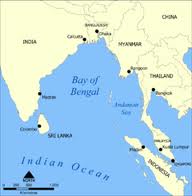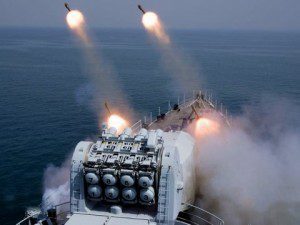It is a scrumptious paradox that the US , which in 1971 sent its the 7th fleet to the Bay of Bengal to desist India from militarily assisting the Bangladesh Liberation War, now wants Bangladesh to host the same the same fleet in order to defend its strategic interests vis-à-vis China as well as in the Indian Ocean. The then US President Richard Nixon and his National Security Adviser- Henry Kissinger who was later on made the Secretary of State , brushed off Archer Blood’s telegram on atrocities in East Pakistan by the Pakistan military. Archer Blood who was the then consul general in Dacca(now Dhaka) , the capital of Pakistan’s eastern wing , even included the term “genocide” in the telegram to his Washington counterpart to describe the inhumane killings of 1971 in the eastern wing of Pakistan. He undertook to describe the bizarre situation to Washington in the way – “as scorching a cable as could be imagined” and “probably the most blistering denunciation of U. S. foreign policy ever sent by its own diplomats.”
Professor Sunil Khilnani , the author of “The Idea of India” and director of the India Institute at King’s College London , has mentioned in his writing on the US policy towards the Bangladesh Liberation War that Blood even criticized America’s Pakistan policy as the “moral bankruptcy” in failing to denounce the massacres , and in continuing the efforts to support the Pakistan military leaderships. In fact, the US had been intervening into Pakistan’s affairs since the country’s very inception. With a view to containing China’s rise as well as communist expansionism in Asia, it was lone strategic choice for the US to go in favor of Pakistan and to make her a strategic ally in the region. Subsequently, the US could successfully incorporate Pakistan in two pacts in the name military and economic aids. One of them is SEATO which was signed in 1954 and the other one is CENTO signed in 1955. Nixon and Kissinger even seemed to be blind to Pakistan for securing their strategic interests in Asia. Notwithstanding, they considered Pakistan’s military leader- General Yahya Khan as an effective tool to defend their geopolitical as well as geo-strategic interests in the region.
Interestingly enough, the question arises as to what factors now place Bangladesh on strategic radar of the US that opposed Bangladesh’s independence? The answer is short and easy to apprehend. That is the country’s geo-strategic setting and geopolitical significance per se which now induce the US to make it a strategic partner. However, Senator Edward Kennedy could realize the geo-strategic significance of Bangladesh, and his uninterrupted efforts led the US to correct its policy mistake back in 1971 by giving an early recognition to the country.
Geopolitical and geo-strategic significance of Bangladesh
Geographic location of Bangladesh has made it geopolitically as well as geo-strategically significant in the South Asia which is now at the center of international politics along with the Europe, South-East Asia and the already volatile Middle East. Bangladesh is a claimant of sufficient attention while discussing about rising importance of the South Asia in global politics as it occupies some but very crucial part of the region. The country has now largely attracted America’s attention mainly for two reasons. First one is the possibility of the rise of religious extremism and the other one is the geo-strategic setting of the country in South Asia and on the edge of the Bay of Bengal.
Bangladesh is the third and the second largest Muslim majority country in the world and in the region respectively which make it sensitive to the US on the question of religious extremism. The tragic 9/11 has brought out dramatic shifts in the American foreign policy priorities. It has now added new dimensions to the American national security strategy. As a part of national security strengthening, they have tightened domestic immigration policy, and declared ‘global war on terror’ which mainly aims at the rise of Islamic militancy throughout the world. In an interview with “The Politic” journal, Dan W. Mozena – the US Ambassador to Bangladesh- said that America’s strategic engagement with Bangladesh has changed following 9/11. The US now seeks to disrupt and tear down those who threaten the US as well as its allies. Irrespective of its policy during the Bangladesh Liberation War, the US and Bangladesh have now successfully improved bilateral relations in the areas of economy, military, trade, and countering global terrorism. Recognizing Bangladesh as a democratic, secular state, the US tries to maintain friendly ties with it, and regards it as a critical strategic partner in South Asia. Noticeably, the US does not as emphasize a ban on Islamic parties of the country, particularly Jamaat-e- islami and Hefajot-e- islam on their accusation of flare-ups of violence in pre and post phases of the recently held the 10th National Parliament Election as the EU does. The US now conceives of the probability of the rise of religious extremism throughout the country and especially in the region already plunged into violent extremism if any sanction be made on them. Democratization throughout the world is another priority issue of the US foreign policy after the end of the cold war. For instance, America’s uninterrupted collaboration with the recent Arab spring. Therefore, the aforementioned issues – religious extremism and democratization – have led Bangladesh to surface on the tactical map of the US and its foreign policy
The key to understanding geo-strategic significance of a country is the comprehensive apprehension of the country’s geographical setting. Bangladesh is almost entirely surrounded by India. Importantly, its close geographical proximity with China oftentimes vexes the US a great deal as China is considered as America’s strategic rival in Asia. In this way Bangladesh is a close neighbor of the two leading members of BRICS, an organization formed with a view to countering the monopolizing of power of the US, and undoing her claim of ‘unipolarity’. In addition, Bangladesh shares ‘small but crucial’ land boundary with Myanmar which is a Chinese ally on the other hand. It stands in the Bay of Bengal as a bridge between the two regional blocs- SAARC and ASEAN. Bangladesh’s geographic setting on the edge of the Bay of Bengal, and its access to Indian ocean entice the US into making it a strategic partner with a view to safeguarding its interests vis-à-vis China, India, and Myanmar, and allure to establish naval base at Bangladesh’s territorial seas.

However, it is apparent from different analyses that the country also depicts same geo-strategic significances to China in the region. China has over the decades improved its relations vis-à-vis the developing countries of Asia as well as Africa. Especially China’s relations with Bangladesh and Pakistan are notable. Russia aside, China has also agreed to provide Bangladesh with assistances for peaceful use of nuclear energy for medicine and electricity generation along with military assistance. By expanding its hands of cooperation , China is now longing for maintaining friendly relations with Bangladesh , and sustaining in this way her influence on the country. Such a development in their bilateralism often makes the US vexed since Bangladesh is an ‘exclusive option’ for securing its strategic interests in the Bay of Bengal and the Indian Ocean.
US’s 7th fleet in the Bangladesh territorial seas & potential geopolitical implications

Since the end of second World War, the bay of Bengal and Indian Ocean regions have drawn immense global attention and been increasingly militarized by the great powers in order to defend their own interests. The US and China are the two main ‘nonnative’ great players of geopolitical games in these regions. However, the US naval base, if once gets established, in Bangladesh’s territorial seas would possibly be converted into a permanent base for US/NATO militaries as it is perceived as a ‘strategic necessity’ of the United States to strengthen its naval presence not just in the region but in the South China sea and whole Asia- Pacific region. Pertinent to be mentioned here , America’s naval strategy is hence projected as to it vies to be a ‘resident Pacific power’ and thus to snaffle up the global maritime supremacy. Generally America’s naval strategy is mostly affected by Alfred Thayer Mahan who was the Union Navy’s Rear Admiral and most distinguished US naval strategist of the 19th century. Mahan in his legendary work ‘The Influence of Sea Power Upon History, 1660–1783’ had accentuated greater sea power for greater global ascendency. However, President Obama in his first incumbent reinvigorated US’s naval strategic policy towards the Asia-Pacific. In 2010, Hilary Clinton during her office as Secretary of State even declared in a speech at the East-West Centre in Hawaii that ‘America’s future is linked to the Asia-Pacific and the future of the region depends on America’. Nonetheless, the United States has now become carked by China’s gradual moves towards the Indian Ocean and naval base establishment in the South China Sea which will significantly expand its strategic presence in the area by enabling its increased submarine activities. China has already established a surveillance base in Myanmar’s Coco Islands. Contrarily, the US has deepened its military ties with the Philippines, Singapore and Australia with a view to countering Chinese maritime rise in the regions. The United States has already taken initiatives vis-à-vis the rotational deployment of 2,500 US marines in Darwin- Australia, and the deployment of up to four of its Littoral Combat Ships (LCS) in Singapore.
Hence the continued militarization in the Indian Ocean and beyond by USA and China would result in greater volatility in the regions. America’s 7th fleet in the bay of Bengal that directly connects the Indian Ocean, might lead to a tripartite- Indo- Bangladesh-US strategic partnership against the rise of China’s maritime ascendency. But in consequences the whole scenario would menace the Indian national security as it would fall into between one friend and one foe ( the US and China respectively). Rijul Singh Uppal , an Indian writer , has expressed concerns over the possibility that the 7th fleet would undermine the Indian current maritime dominance, and bring all Indian missile test sites on its eastern coast under direct US surveillance. Rijul suggests New Delhi has to have a stab at urging Dhaka not to let the US park the 7th fleet in Bangladesh’s territorial seas in the Bay of Bengal. Hence , to improve ties with Dhaka is again a ‘strategic necessity’ of New Delhi, which on the other hand provides Dhaka with a prerogative in diplomatic bargains with its New Delhi’s counterpart on efficaciously resolving the issues of Teesta Water crisis, disputes over land and maritime boundaries, and BSF’s continued border killings etc.
So, at the end of the discussion it is pertinent to say that aforementioned aspects of geo-strategic and geopolitical dimensions of Bangladesh can help empathize with its potentiality and increasing significance in international politics. The country is now a claimant of great appreciation in regional as well as global politics despite its diminutive figure in the global map. Geo-strategic and geopolitical implications of Bangladesh draw the attention of not just the US but of the other regional and global powers. So the politicians and the bureaucrats should now make a stab at reassessing and reckoning the country’s growing geo-strategic importance. They ought to prioritize the highest national interests over the regime interests while formulating policies vis-à-vis other countries. Generally Bangladesh’s foreign policy is formulated upon the basis of the regime interests. Consequently, regime changes drive to the frequent changes of foreign policy which can contribute less, and /or be proved ineffectual while dickering with other partners on particular issues. Therefore, Bangladesh needs to have a stab at formulating a very viable and consistent foreign policy for securing and upholding its national interests at the regional and international levels.
Tanbir Uddin Arman
Research Assistant
Bangladesh Institute of Peace and Security Studies (BIPSS),
House # 405, Road # 6
DOHS, Baridhara,
Dhaka-1206
Cell: +8801811186815
Email: tanbirarman30@gmail.com






